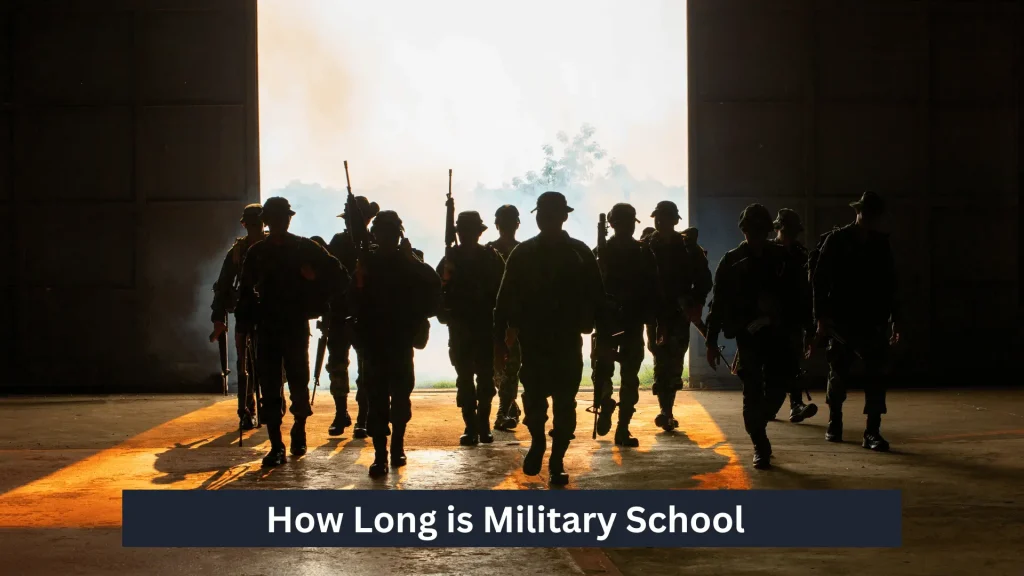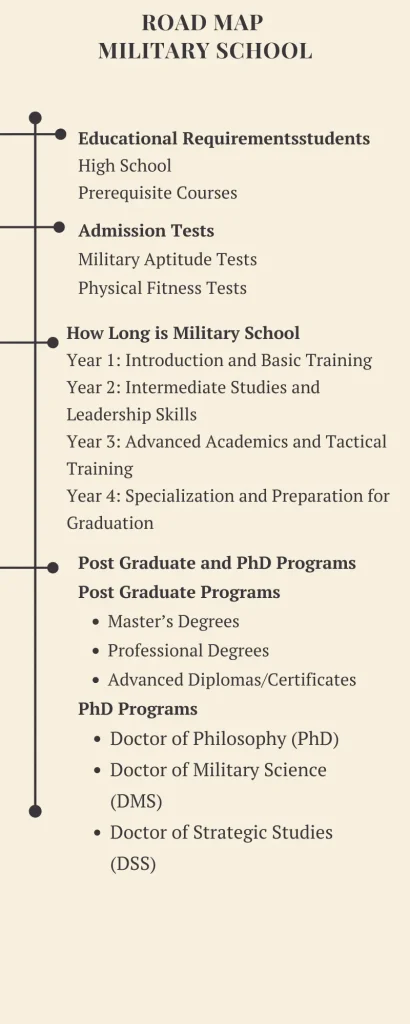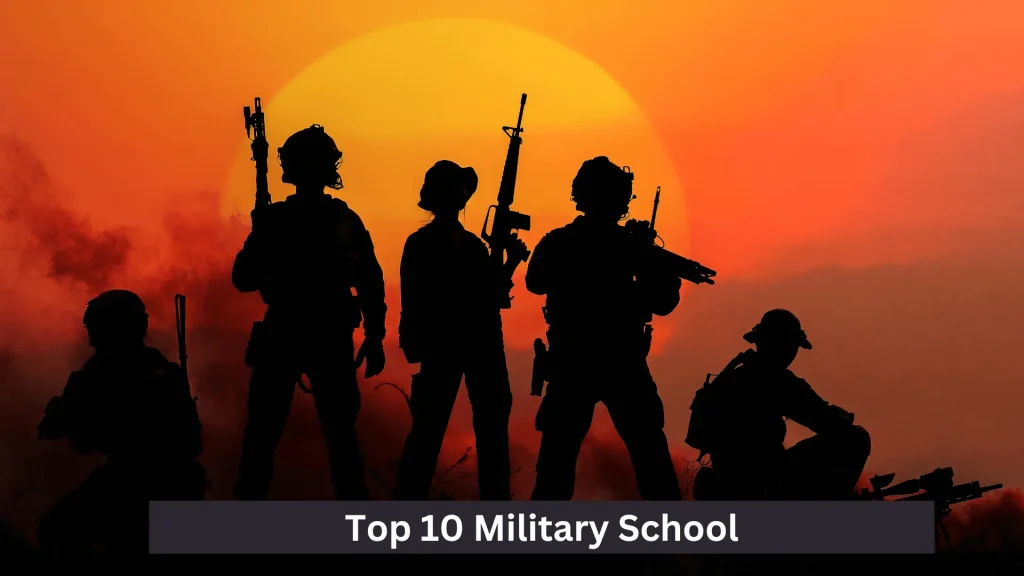How Long is Military School
Military school programs vary in length. Some are designed for high school students and last four years, while others offer shorter programs ranging from several weeks to a few months. The length depends on the institution and the specific program. So, how long is military school? It varies greatly.
What is Military School
Military school is an educational institution that combines academic coursework with military training. These schools aim to instill discipline, leadership skills, and a strong sense of responsibility in their students. They typically offer rigorous academic programs alongside physical training, military drills, and character-building activities.

Students at military schools are often required to adhere to strict codes of conduct and wear uniforms. These schools can serve as preparatory institutions for military careers or simply provide a structured environment that promotes personal development. Military schools emphasize respect, honor, and teamwork, preparing students for future success in various fields.
How Long is Military School
Year 1: Introduction and Basic Training
In the first year, students undergo basic military training and orientation. They learn the fundamentals of military discipline, physical fitness, and drill routines. Academic coursework typically includes general education subjects such as mathematics, science, English, and history. Emphasis is placed on developing time management, study habits, and adapting to the structured military environment.
Year 2: Intermediate Studies and Leadership Skills
The second year focuses on intermediate academic courses and enhancing leadership skills. Students begin to take more specialized courses related to their field of interest, such as engineering, technology, or international relations. Leadership training becomes more prominent, with students taking on roles in planning and executing group activities. Physical training continues, with increased focus on endurance and team-building exercises.
Year 3: Advanced Academics and Tactical Training
In the third year, students delve deeper into their chosen academic disciplines. They take advanced courses that prepare them for their future careers, both within and outside the military. Tactical training becomes a significant part of the curriculum, where students learn more complex military strategies and operations. Leadership roles become more challenging, with students often leading larger groups and participating in more sophisticated exercises.
Year 4: Specialization and Preparation for Graduation
The final year is dedicated to specialization and preparation for graduation. Students complete their advanced academic courses and may undertake capstone projects or theses related to their fields of study. Military training is at its peak, with students participating in simulated combat scenarios and advanced leadership tasks. Preparation for graduation includes career planning, whether for military service or civilian careers, and ensuring all academic and training requirements are met.

How to Enter Military School
Educational Requirements for Military School
Minimum Education Level: Typically, applicants need to have completed certain grade levels, such as middle school or junior high, to be eligible for entry into a military high school program. For post-secondary military academies, a high school diploma or equivalent is required.
Academic Performance: Many military schools require a minimum GPA. Strong performance in core subjects like mathematics, science, and English is often expected.
Physical Fitness: Applicants may need to demonstrate physical fitness and meet health standards. Some schools have specific fitness assessments as part of the application process.
Entry Tests for Military School
Standardized Tests: Applicants might be required to take standardized tests such as the SSAT (Secondary School Admission Test) for military high schools, or the SAT/ACT for military colleges.
Military Aptitude Tests: Specific military aptitude tests like the ASVAB (Armed Services Vocational Aptitude Battery) may be required for some programs.
Physical Fitness Tests: Physical fitness assessments to test strength, endurance, and agility are common, often including running, push-ups, sit-ups, and other exercises.
Application Process for Military School
Research and Selection: Prospective students should research various military schools to understand their unique offerings, culture, and requirements.
Application Form: Complete and submit the application form, which can typically be found on the school’s website.
Transcripts and Records: Submit academic transcripts and records from previous schools attended.
Letters of Recommendation: Provide letters of recommendation from teachers, counselors, or other mentors.
Personal Statement/Essay: Write a personal statement or essay explaining the applicant’s interest in military school and future goals.
Interviews: Participate in interviews, which may be conducted in person or virtually. These interviews assess the applicant’s fit for the school’s environment and mission.
Application Fee: Pay any required application fees.
Financial Aid for Military School
Scholarships: Many military schools offer merit-based scholarships for students who excel academically, athletically, or in other areas.
Need-Based Aid: Financial aid based on family income and financial need is available at many institutions.
Military Benefits: For children of military personnel, specific benefits and financial aid options may be available.
Payment Plans: Some schools offer flexible payment plans to help families manage tuition costs.
Work-Study Programs: Opportunities for work-study programs may also be available, allowing students to work on campus to offset tuition costs.
Postgraduate Programs for Military Schools
Postgraduate Program
1. Master’s Degrees
Types: Military schools may offer master’s degrees in fields like Military History, Strategic Studies, National Security, Defense Analysis, International Relations, and Military Leadership.
Requirements: A bachelor’s degree from an accredited institution, letters of recommendation, a statement of purpose, and often relevant military or professional experience.
Duration: Typically 1 to 2 years, depending on the program and whether it is pursued full-time or part-time.
2. Professional Degrees
Types: Some military schools offer professional degrees such as a Master’s in Military Studies, which focuses on advanced concepts in military strategy and operations.
Requirements: Similar to master’s degrees, but may also require specific military experience or current military service.
Duration: Usually 1 to 2 years.
3. Advanced Diplomas/Certificates
Types: Advanced diplomas or certificates in specialized areas such as Cybersecurity, Intelligence, or Defense Management.
Requirements: Bachelor’s degree and relevant work experience; some programs may require current military status.
Duration: Typically 6 months to 1 year.
PhD Programs for Military Schools
1. Doctor of Philosophy (PhD)
Types: PhDs may be available in areas like Military Science, Strategic Studies, Security Studies, International Relations, and Defense Economics.
Requirements: A master’s degree in a related field, a strong academic record, research proposal, letters of recommendation, and often a relevant background in military or defense sectors.
Duration: Generally 3 to 5 years, depending on the research and dissertation requirements.
2. Doctor of Military Science (DMS)
Types: Some military schools offer a specialized doctoral degree focusing on advanced military science, strategy, and operational theory.
Requirements: A master’s degree and significant professional experience in the military or defense sector.
Duration: Usually 3 to 4 years, involving both coursework and dissertation research.
3. Doctor of Strategic Studies (DSS)
Types: Focuses on advanced topics in strategy, military history, and defense policy.
Requirements: Similar to a PhD, with a master’s degree, research proposal, and relevant professional background.
Duration: Typically 3 to 5 years.
Top 10 Military Schools
Here are ten of the top military schools known for their rigorous academics, leadership training, and military programs:

1. United States Military Academy (West Point)
Location: West Point, New York, USA
Overview: One of the most prestigious military academies, West Point offers a comprehensive education with a strong focus on leadership and military training. It is renowned for producing high-ranking officers in the U.S. Army.
2. United States Naval Academy (Annapolis)
Location: Annapolis, Maryland, USA
Overview: The Naval Academy is known for its excellent education in engineering, science, and the humanities, alongside naval and military training. Graduates are commissioned into the U.S. Navy and Marine Corps.
3. United States Air Force Academy
Location: Colorado Springs, Colorado, USA
Overview: Focuses on preparing future leaders for the U.S. Air Force through a rigorous academic program and extensive military training. The academy is known for its strong emphasis on aerospace studies.
4. United States Coast Guard Academy
Location: New London, Connecticut, USA
Overview: Offers education and training to future Coast Guard officers. The academy provides a strong focus on maritime studies and leadership.
5. Royal Military Academy Sandhurst
Location: Sandhurst, Berkshire, England
Overview: The premier British military academy, Sandhurst trains future officers for the British Army. It is renowned for its leadership development and rigorous military training.
6. Canadian Military Colleges (Royal Military College of Canada)
Location: Kingston, Ontario, Canada
Overview: The Royal Military College provides a university education combined with military training, preparing officers for the Canadian Forces.
7. Australian Defence Force Academy
Location: Canberra, Australia
Overview: Offers education and training for future leaders of the Australian Defence Force, combining academic studies with military training.
8. National Defense Academy of Japan
Location: Yokosuka, Kanagawa, Japan
Overview: Provides comprehensive education and military training to future officers of the Japan Self-Defense Forces. It is known for its rigorous academic and military programs.
9. École Militaire (French Military Academy)
Location: Paris, France
Overview: The École Militaire is a prestigious institution that trains officers for the French Army. It offers advanced military education and leadership training.
10. Indian Military Academy
Location: Dehradun, India
Overview: Trains officers for the Indian Army. The academy offers a rigorous curriculum combining academic education with military training.
Factors Affecting the Length of Military School
The length of military school programs can be influenced by several factors:
1. Type of Military School
High School Programs: Military high schools typically last for the standard four years of secondary education, covering grades 9 through 12.
Undergraduate Programs: Military colleges or academies usually offer a four-year undergraduate degree program.
Graduate Programs: Master’s and doctoral programs vary in length, typically ranging from 1 to 5 years, depending on the level of study and research requirements.
2. Program Focus
General Military Training: Programs focused on basic military training and leadership development may have shorter durations, often a few weeks to several months.
Specialized Training: Programs with specialized fields such as engineering, aviation, or intelligence may extend the duration due to additional coursework and training requirements.
3. Curriculum and Academic Requirements
Course Load: The number of required courses and credit hours can impact the length of the program. More intensive curriculums may extend the duration.
Dissertation/Capstone Projects: For advanced degrees, the time required for research, writing, and defense of dissertations or capstone projects can influence the overall length.
4. Academic and Physical Standards
Pace of Progress: Students’ ability to meet academic and physical standards may affect the duration. Those who need additional time to complete coursework or meet physical requirements may have longer programs.
Remedial Courses: Students who need to complete remedial courses or additional training may experience extended program durations.
Final Verdict
The length of military school programs varies widely based on the type of institution, focus, curriculum, and individual progress. Understanding these factors helps prospective students prepare effectively and manage expectations, ensuring a smoother educational and training experience.
FAQs
1.What is the typical duration of military high school programs?
Military high school programs usually last four years, covering grades 9 through 12.
2.How long do undergraduate military college programs take to complete?
Undergraduate programs at military colleges typically take four years to complete.
3.What factors can affect the length of a military school program?
Factors include the type of school, program focus, curriculum requirements, academic and physical standards, and student participation.
4.Are there differences in program length for specialized military training?
Yes, specialized programs may be longer due to additional coursework and training requirements.
5.How does full-time versus part-time enrollment impact program length?
Full-time students generally complete programs more quickly than part-time students.
